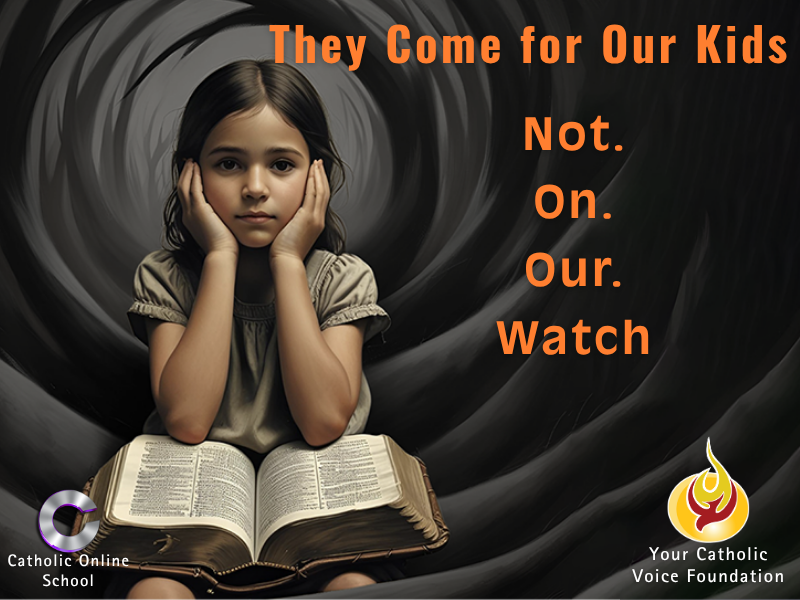 Dear readers, Catholic Online was de-platformed by Shopify for our pro-life beliefs. They shut down our Catholic Online, Catholic Online School, Prayer Candles, and Catholic Online Learning Resources essential faith tools serving over 1.4 million students and millions of families worldwide. Our founders, now in their 70's, just gave their entire life savings to protect this mission. But fewer than 2% of readers donate. If everyone gave just $5, the cost of a coffee, we could rebuild stronger and keep Catholic education free for all. Stand with us in faith. Thank you. Help Now >
Dear readers, Catholic Online was de-platformed by Shopify for our pro-life beliefs. They shut down our Catholic Online, Catholic Online School, Prayer Candles, and Catholic Online Learning Resources essential faith tools serving over 1.4 million students and millions of families worldwide. Our founders, now in their 70's, just gave their entire life savings to protect this mission. But fewer than 2% of readers donate. If everyone gave just $5, the cost of a coffee, we could rebuild stronger and keep Catholic education free for all. Stand with us in faith. Thank you. Help Now >
David O'Bruadair
FREE Catholic Classes
An Irish poet, b. about 1625, most probably in the barony of Barrymore, Co. Cork, but according to many authorities in that of Connello, Co. Limerick ; d. January 1698. He was well educated in the Irish, Latin, and English language. His historical poems show the influence of Geoffrey Keating, his favorite Irish author. He wrote elegies on the deaths of many historically prominent members of the leading Munster families, especially the Bourkes of Cahirmoyle, the Fitzgeralds of Claonghlais, and the Barrys of Co. Cork, who later befriended him in his poverty. All his poems, whether historical, social, or elegiac, are marked by a freshness rare in the seventeenth century and they furnish many interesting details about the life and manners of his time. Two of his epithalamia, a form of composition rare in Irish literature , have been preserved. They were written to celebrate the marriages of the sisters, Una and Eleanore Bourke of Cahirmoyle. His satires when directed against the Cromwellian Planters ;or the Duke of Ormonde and his flatterers are bitter, but lighter and more humorous when treating themes of local interest, as in the case of his witty proverbial "Guagan Gliog", or his mock-heroic defence of the smiths of Co. Limerick. His religious poems exhibit great beauty and depth of feeling, especially the poem on the Passion of Christ. Others like those on the schismatical movement of the Remonstrants (1666-70) and on the Oates Plot (1678-82) are polemical and contain details not found elsewhere.
His political poems treating the events of Irish history from the Cromwellian Plantation (1652) to the end of the War of the Revolution (1691) reveal his great political foresight and independent views. His "Suim Purgadora bhfear n-Eireann" summarizes the history of Ireland from 1641 to 1684, and a series of poems commemorates the exciting events of the reign of James II (1685-91). Being written from a national and Catholic standpoint, these poems, owing to a dearth of Irish documents relating to that period, are invaluable for the light which they throw upon the sentiments of the Irish nobles and people during that half-century of war, confiscation, and persecution. Despite his enthusiasm for the national cause, O'Bruadair is no mere eulogizer, and in "An Longhriseadh" (The Shipwreck, 1691), he criticizes the army and its leaders severely. He warmly defended the conduct of Sarsfield in the negotiations preceding the close of the war (1691). His views upon this subject, when compared with those of Colonel O'Kelly in his "Macariæ Excidium", enable us to appreciate better the divergence of opinions in Irish military circles in regard to the acceptance of the terms offered. O'Bruadair was a master of the art of versification, and wrote with ease and grace in the most varied and complicated syllabic and assonantal metres. His style is vigorous, his language is classical, and his vocabulary extensive; but a fondness for archaic expressions prevented most of his poems from being popular in the succeeding centuries. He is copious in illustration, careful to avoid repetition, and never sacrifices reason to rhythm. Though he was an expert scribe and an industrious copyist of ancient historical manuscripts, the only existing manuscript in his handwriting seems to be H. 1. 18 fol. 4 to 14 in the library of Trinity College, Dublin. It contains three of his latest poems (1693- 4), some genealogical matter taken from "Leabhar Iris Ui Mhaoilchonaire" and the "Rental" of Baron Bourke of Castleconnell, Co. Limerick. Most of his poems are preserved in three early manuscripts : 23 M. 25-23 M. 34, by Eoghan O Caoimh (1702), and 23 L. 37, by Seaghan Stac (1706-9), both in the Library of the Royal Irish Academy, Dublin, and Add. 29614, by Seaghan na Raithineach (1725), in the British Museum. Others are to be found in various manuscripts In the above-mentioned libraries and in those of Trinity College, Dublin, Maynooth, while a few are preserved in manuscripts In private hands. A complete collection of his writings with translation, of which the first volume has appeared (1910), is in course of publication by the present writer for the Irish Texts Society, London.
Join the Movement
When you sign up below, you don't just join an email list - you're joining an entire movement for Free world class Catholic education.
-

- Easter / Lent
- Ascension Day
- 7 Morning Prayers
- Mysteries of the Rosary
- Litany of the Bl. Virgin Mary
- Popular Saints
- Popular Prayers
- Female Saints
- Saint Feast Days by Month
- Stations of the Cross
- St. Francis of Assisi
- St. Michael the Archangel
- The Apostles' Creed
- Unfailing Prayer to St. Anthony
- Pray the Rosary
A Generation Without Christ Breeds Violence — The Answer Is Catholic Education
Rediscovering the Face of God in Others: Pope Leo’s Call to Fraternity
‘Blessed are the Peacemakers’: A Catholic Response to America’s Mass-Shooting Crisis
Daily Catholic
 Daily Readings for Saturday, September 13, 2025
Daily Readings for Saturday, September 13, 2025 St. John Chrysostom: Saint of the Day for Saturday, September 13, 2025
St. John Chrysostom: Saint of the Day for Saturday, September 13, 2025 A Prayer for the Gift of Wisdom: Prayer of the Day for Saturday, September 13, 2025
A Prayer for the Gift of Wisdom: Prayer of the Day for Saturday, September 13, 2025 Daily Readings for Friday, September 12, 2025
Daily Readings for Friday, September 12, 2025 St. Ailbhe: Saint of the Day for Friday, September 12, 2025
St. Ailbhe: Saint of the Day for Friday, September 12, 2025- Family Prayer Time: Prayer of the Day for Friday, September 12, 2025
![]()
Copyright 2025 Catholic Online. All materials contained on this site, whether written, audible or visual are the exclusive property of Catholic Online and are protected under U.S. and International copyright laws, © Copyright 2025 Catholic Online. Any unauthorized use, without prior written consent of Catholic Online is strictly forbidden and prohibited.
Catholic Online is a Project of Your Catholic Voice Foundation, a Not-for-Profit Corporation. Your Catholic Voice Foundation has been granted a recognition of tax exemption under Section 501(c)(3) of the Internal Revenue Code. Federal Tax Identification Number: 81-0596847. Your gift is tax-deductible as allowed by law.



 Daily Readings for Saturday, September 13, 2025
Daily Readings for Saturday, September 13, 2025 St. John Chrysostom: Saint of the Day for Saturday, September 13, 2025
St. John Chrysostom: Saint of the Day for Saturday, September 13, 2025 A Prayer for the Gift of Wisdom: Prayer of the Day for Saturday, September 13, 2025
A Prayer for the Gift of Wisdom: Prayer of the Day for Saturday, September 13, 2025 St. Ailbhe: Saint of the Day for Friday, September 12, 2025
St. Ailbhe: Saint of the Day for Friday, September 12, 2025

